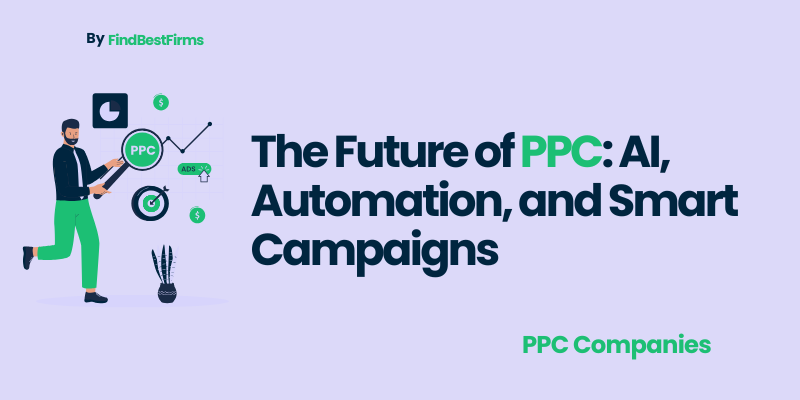One of the surest forms of digital marketing that has been used by businesses all over the world is Pay-Per-Click (PPC) advertising. As compared to the old-fashioned marketing channels where the response is mostly hard to quantify, PPC provides the business with immediate exposure, quantifiable information, and a clear picture of the return on investment (ROI). PPC advertising is flexible and scalable, which other means are not always able to achieve, whether it is a small e-commerce startup or a multinational brand.
But PPC is changing. Smart(er), data-centered solutions driven by Artificial Intelligence (AI), automation, and intelligent campaigns are replacing the manual keyword targeting and endless campaign optimization. These inventions are not only transforming the PPC campaign into the most efficient one, but also making it more effective in reaching the right audience at the right time.

Understanding Today’s PPC Landscape
Traditionally PPC has been on the four pillars of keywords, ad copy, bids, and performance monitoring. A business would do research on keywords, place manual bids, create several versions of ads and constantly check the performance of the campaign to maximize the results.
This method was a success, however, it was not lacking difficulties:
Increased Costs-With more companies joining the digital advertising industry competition grew, and cost-per-click (CPC) was pushed up.
Complex Campaigns- The large amount of targeting choices, the new forms of adverts and updates in the platforms made campaigns difficult to control.
Time-Consuming- It took a lot of time and skill to do manual adjustments on bids, ad testing and performance analysis.
Customer Expectations- The contemporary customers demand customized experiences, and the old fashioned advertisements which showed one single, and common, advertisement are not working.
These complications provided a disconnect between what the businesses desired (high ROI at reduced complexity) and what the traditional PPC solutions could provide them. The tools that are filling this gap are AI, automation, and smart campaigns.
The Role of Artificial Intelligence in PPC
PPC advertising is being propelled by AI. It is fast, accurate, and sophisticated, something that manual campaign management would never be.
Here’s how AI is reshaping PPC:
Predictive Analytics- AI takes collected data on historical campaigns and forecasts the most likely key words, placements and audiences to produce conversions. This assists in the allocation of budget by businesses.
Smart Bidding– AI-driven smart bidding strategies do not rely on guessing bids or manually adjusting bids, but optimize it in real time. As an example, the Target CPA or Target ROAS bidding categories in Google Ads will automatically raise or lower themselves depending on the likelihood of conversion.
Audience Insights- AI has the ability to track user behavior on site and devices creating precise audience segments. As an illustration, when one goes online to buy winter jackets, AI makes sure that your jacket advertisement shows up before the user even begins to search.
Dynamic Ad Creation AI is capable of creating and testing variations on ads on a large scale, only displaying the most useful ads. This decreases wastage on advertising funds and enhances the click through rates (CTR).
Fraud Detection- AI systems can identify invalid clicks or suspicious activity and ensure that companies do not lose their funds on ad fraud.
PPC advertising with AI is more of a strategy and creative approach and not repetitive manual work.
Automation in PPC Campaigns
Closely related to AI is automation that is aimed at decreasing the amount of human input in the management of campaigns. It also does not require manual adjustments, which gives the businesses the time to concentrate on higher levels of planning.
Some examples of automation in PPC are:
Automated Bidding- Bids getting adjusted automatically as per user activity and competition.
Responsive Search Ads (RSAs)- Automatically testing headlines and descriptions to deliver the most promising one.
Rule-Based Campaign Management- Rule establishment like pausing adverts in case of exceeding CPC or spend more when conversions are good.
Automated Reporting- Installing live performance dashboards in place of hours of pulling spreadsheet data.
Smart Campaigns: The Next Big Shift
Smart campaigns are designed to make PPC accessible for everyone, even businesses with little to no marketing expertise. They combine AI and automation to simplify campaign creation and management.
With smart campaigns:
- You don’t need deep keyword knowledge—Google handles targeting.
- Ad creation is simplified—businesses provide basic information, and Google generates variations.
- Bidding and placements are automatically optimized for maximum results.
Smart campaigns are especially useful for small and medium businesses. They can get professional-level PPC advertising results without hiring an entire in-house team. For larger companies, smart campaigns serve as an efficient tool for running specific campaigns with minimal effort.
Benefits of AI, Automation, and Smart Campaigns in PPC
The adoption of AI, automation, and smart campaigns in PPC advertising isn’t just about saving time—it’s about achieving better results, smarter targeting, and sustainable growth. Let’s look at the key benefits in detail:
1. Efficiency
Automation eliminates repetitive tasks like bid adjustments, A/B testing, and reporting. This allows marketers to focus on high-value activities such as building creative strategies, improving ad messaging, and refining customer journeys.
2. Precision Targeting
AI analyzes vast amounts of real-time data to match ads with the right audience. Instead of generic targeting, businesses can now reach people most likely to engage and convert, improving ad relevance significantly.
3. Cost Savings
Smart bidding strategies prevent overspending by automatically optimizing ad spend. Budgets are directed toward high-performing keywords and audiences, ensuring every dollar works harder.
4. Improved Conversions
AI continuously tests ad variations and serves the best-performing ones. This leads to higher click-through rates (CTR) and better conversion outcomes, boosting overall ROI.
5. Accessibility
Small and medium businesses benefit greatly from smart campaigns, as they can compete with larger brands without needing a full in-house PPC team.
Challenges and Considerations
While AI, automation, and smart campaigns bring immense value to PPC advertising, they are not without limitations. To maximize their potential, businesses need to understand the challenges involved:
1. Over-Reliance on Technology
Automation can make campaign management easier, but depending too heavily on it may reduce human oversight. Without regular monitoring, businesses risk missing optimization opportunities or overlooking performance issues that only a human eye can detect.
2. Data Privacy Concerns
AI-driven PPC strategies rely heavily on user data for targeting and personalization. This raises concerns about data privacy, ethical usage, and compliance with laws like GDPR. Mishandling user data could harm both performance and brand reputation.
3. Loss of Creative Control
Machines excel at optimizing bids and targeting, but they cannot replace human creativity. Ad copy, brand storytelling, and emotional appeal still require human input to resonate with audiences on a deeper level.
4. Learning Curve
While AI tools simplify campaign management, they also come with a learning curve. Businesses must invest time to understand how to use these technologies effectively or risk underutilizing their full potential.
The Future of PPC: What to Expect
The PPC advertising is now enjoying a new dawn in which technology and creativity in service of man will be extremely interdependent as never before. The following are some of its critical trends:
1. Hyper-Personalization
AI will become smarter and more personalized ads that change in real-time based on user behaviors, interests, and preferences. Businesses will no longer reach out to an entire mass of people but will send information to a single person, which makes advert messages more specific and effective.
2. Predictive Campaigns
The campaigns will shift to proactive campaigns. AI will anticipate customer demand before the user starts searching, identifying the business with the prospects by analyzing historical data and trends to engage the business at an earlier stage of the purchase process.
3. Voice and Visual Search
As voice assistants like Alexa and Siri become more popular, and image-based search is increasingly more popular, PPC will cease to be text-based advertising. To stay competitive, the brands will be forced to introduce voice-optimized queries and visual-first campaigns.
4. Video-Centric PPC
Video has already taken over digital content and PPC will do so. Video advertisements will be a new norm, as companies will have more interactive means of reaching their target audience and converting them into customers.
5. Strategic Roles for Experts
With automation taking the technical workload, PPC specialists will move their interest towards being creative, storytelling, and making strategic decisions. They will not be as involved in actual manual execution, but will rather spearhead campaigns in a human way.
In summary: The future of PPC will be a collaboration between machines and control over data and automation, human beings will operate through creativity, strategy and brand relation.
Tips for Businesses to Prepare for the Future of PPC
Adapting to the evolving world of PPC advertising requires businesses to be proactive. Here are some practical steps to ensure you’re ready for the future:
1. Adopt Automation Early
Start experimenting with smart bidding strategies, responsive search ads, and automated reporting now. Early adoption helps you understand how these tools work and gives you an advantage over competitors who wait.
2. Stay Creative
AI and automation handle the technical side, but creativity remains uniquely human. Focus on compelling ad copy, storytelling, and visuals that resonate with your audience. Strong messaging paired with smart technology is the winning formula.
3. Test Smart Campaigns
Even if you’re experienced with traditional campaigns, try running smart campaigns. They provide valuable insights into how AI-driven targeting and bidding can simplify management while delivering measurable results.
4. Partner with Experts
Working with the Top Pay Per Click (PPC) Companies ensures you get the best of both worlds: cutting-edge automation combined with expert guidance. Professionals know how to balance machine efficiency with human creativity for maximum impact.
5. Keep Learning
PPC platforms evolve quickly, with new features and updates rolling out regularly. Stay updated through training, webinars, and industry reports to keep your strategies ahead of the curve.
Final Thoughts
The future of PPC advertising is intelligent, automated, and data-driven, but it still needs the human touch. AI and smart campaigns will handle the technical details, while businesses and PPC experts bring creativity and strategy. Those who embrace this balance early often with the support of the Top Pay Per Click (PPC) Companies—will be best positioned to maximize results and stay ahead in the evolving digital landscape.

